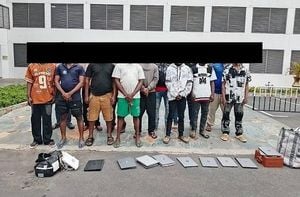In a dramatic turn of events that has captivated Brazil and sent shockwaves through global political circles, Jair Bolsonaro, the country’s 70-year-old former president, finds himself at the center of a historic legal battle. In September 2025, Bolsonaro became the first president in Brazil’s history to be convicted for plotting a coup d’état, receiving a staggering 27-year prison sentence, as reported by The Economist and The Guardian. The conviction marks a watershed moment for Brazil’s democracy, but it is far from the end of the story.
Bolsonaro’s current predicament is as much about politics as it is about the law. According to multiple sources, including MoneyWeek and Folha de S.Paulo, Bolsonaro is appealing the conviction. Yet, those close to the process say his chances of overturning the verdict are slim. The failed attempt to seize power in January 2023, which included an alleged plan to assassinate sitting president Luiz Inácio Lula da Silva, his vice-president, and a Supreme Court judge, has left little room for leniency in the eyes of the judiciary.
Despite the gravity of the charges, Bolsonaro’s allies are not giving up. In Congress, his supporters from the PL party are pushing for an amnesty bill that could either reduce his sentence or ensure he serves it entirely under house arrest. This maneuver has sparked mass protests across Brazil, with demonstrators both supporting and opposing the former president’s fate. According to Folha de S.Paulo, Bolsonaro’s camp is adamant that any penalty reduction must come with the guarantee that he remains under house arrest, a condition seen as critical given his age and declining health.
Bolsonaro’s physical and emotional state has become a focal point of his defense. Allies describe him as weakened, suffering from persistent hiccup crises and vomiting. In mid-September, he was hospitalized in Brasilia after a sudden drop in blood pressure and general malaise. Those close to him say he displays signs of discouragement that resemble depression. “If the former president goes to a prison or even the Federal Police jail, he may end up dying,” one ally argued, as reported by Folha de S.Paulo. His legal team is expected to exhaust all appeals by the end of the year, with any real prospect of imprisonment looming after that.
The push for amnesty is fraught with political tension. The PL party’s official stance remains a broad and general amnesty for all convicted in connection to the January 8 attacks—an agenda that would include Bolsonaro himself. However, the likelihood of such a sweeping measure passing is dwindling. “Bolsonaro’s allies admit to being increasingly unlikely the broad amnesty, which contemplates all convicts in the scammer attacks of January 8 and the former president himself,” Folha de S.Paulo notes. Still, deputies are expected to keep up their efforts until the last possible moment, even as alternative scenarios are quietly discussed behind closed doors.
One such scenario considers the possibility of a reduced sentence, taking into account Bolsonaro’s age, health, and the potential election of a right-wing president in 2026 who might grant him a pardon. The mayor of Paraíba, who played a key role in articulating the penalty reduction proposal, has been trying to balance competing interests within the party, facing criticism from both hardliners and moderates.
Meanwhile, the amnesty bill itself is still in flux. Paulinho da Força, the lawmaker behind the latest draft, says his proposal would cover all convicts, including Bolsonaro, by making changes to the Penal Code that would apply retroactively. However, it remains unclear whether the bill will garner enough support to reach a plenary vote. On September 23, Paulinho met with PL members to discuss the proposal, but divisions persist. “It was clear that the PL, as a whole, that the narrative of penalty reduction, the dosimetry does not meet. (…) We will ask to guide the text we understand to be correct, amnesty, and those parties who understand to be opposed, vote against. But the text is not invented,” stated opposition leader Zucco (PL-RS).
The debate over Bolsonaro’s fate is playing out against a backdrop of deep polarization. His supporters, many of whom see him as a martyr, have organized vigils and prayer sessions, with evangelical leaders encouraging their followers to pray for him. They believe Bolsonaro is being politically persecuted—a sentiment echoed by former U.S. president Donald Trump, who has publicly decried the prosecution as a “witch-hunt” against his “friend.” Eduardo Bolsonaro, Jair’s son, has relocated to Texas to lobby for his father’s cause, even supporting the 50% tariffs imposed on Brazil in July and hinting at possible sanctions against the Supreme Court judges involved in the trial.
Bolsonaro’s rise and fall are deeply intertwined with Brazil’s recent history. Born in 1955 in São Paulo state to working-class parents, he was inspired to join the army after witnessing a shoot-out between police and leftist guerrillas. His nostalgia for military rule has been well documented. In a 1999 interview, as noted by the BBC, he declared that if he ever became president, he would stage a coup on his first day and “finish the work” of the dictatorship by killing 30,000 people. While he refrained from such extreme actions during his presidency, his tenure was marked by policies that eroded trust in democratic institutions and caused significant damage to the Amazon rainforest, as outlined by The Economist.
Bolsonaro’s populist, nationalist approach—modeled in many ways after Donald Trump’s playbook—resonated with a country weary from crime and corruption scandals. But his conviction now sends a powerful signal. “Brazil has successfully upheld the will of the people against the scheming of a populist would-be autocrat… It shows others what is possible,” The Guardian observed. The implications extend far beyond Brazil’s borders, offering a case study in democratic resilience at a time when such values are under threat worldwide.
Looking ahead, Bolsonaro’s influence is likely to persist, especially with the 2026 presidential election on the horizon. Whether he ultimately serves time in prison, remains under house arrest, or receives a pardon from a political ally, the legacy of his presidency—and the fierce debates it has sparked—will linger in Brazil’s political landscape for years to come.




